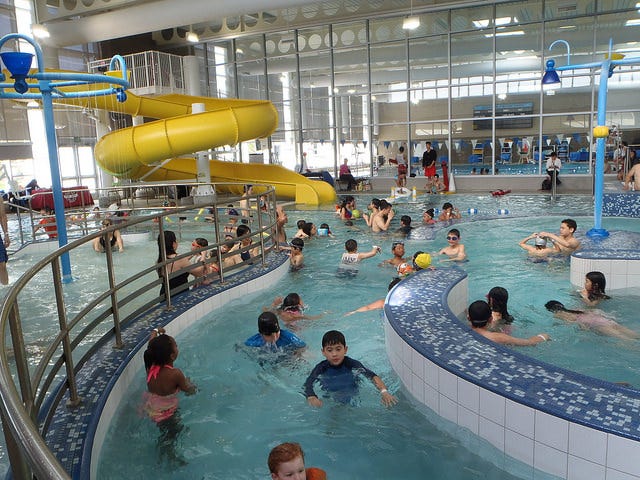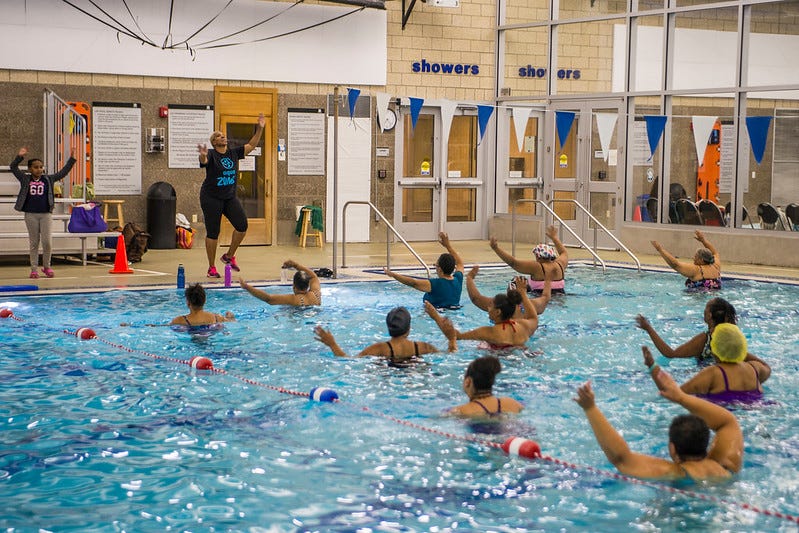Helping a Stranger Put on Her Bra
The simple act of behaving like kin helps us FEEL more like kin.
In celebration of my birthday, get 30% off annual subscriptions – a rate you can keep forever. But beware the Ides of March – promo ends imminently, on March 15!
This week I had planned to write about why it’s important for Aunties to tell kids about our preferences… but then I felt like telling the bra story below, so now I’m doing two short posts one after the other today. Let’s see how it goes!
Tell Kids Your Preferences
My niece and I recently got into a battle of wills at Disneyland. It was the last day of a multi-day trip, and I was renting a mobility scooter – a task my niece loved to help with. At the counter, they had a few things for sale, including autograph books that you could get signed by Disney characters in the park. She reaaaaally wanted it, and I definitely wasn’t going to get it for her. She insisted. I said no. She said, “why not?” I said, irritated, “because it’s junk.” I said we only had one day left and she’d already met a lot of Disney characters – we probably weren’t going to seek of them out and the book would stay mostly blank and be soon forgotten and it was a waste of money. She wouldn’t take no for an answer. Eventually, her dad had to come and haul her away from the rental counter.
Here’s what I wish I had told her: “I don’t buy gifts for kids.” I can’t know what would have happened, but I suspect this one move – telling her my truth, which is that I don’t like to buy gifts – might have cut the argument short. I’m curious.
I’ve found that telling kids my preferences is a great way to forestall their negotiations. I’m more successful at getting a kid to leave the playground when I tell the truth that I’m getting bored, as opposed to if I say “it’s time to go” or “it’s almost dinnertime.” When they want to play pretend unicorn families, my “I don’t like playing pretend” often puts an end to their cajoling. It turns out that when you treat kids like human beings who are capable of understanding other people’s motivations, they often rise to the occasion.
So if you don’t like to play pretend, you should let the kids in your life know. If you prefer that they clean up one toy before getting out another because clutter stresses you out, tell them. If you’re burned out on reading Cars and Trucks and Things that Go, make it known. They need to hear that other people, including adults, have specific likes and needs and wants. They often shrug and roll with it and have just as nice a time as they would have if we did it their way.
Telling kids about our likes and dislikes, our wants and needs, is good for them and good for their adult caretakers and good for society. When we ask kids to be responsive to our preferences, we make time with kids more pleasant for ourselves – and that makes the work of caretaking more sustainable. For Aunties and other alloparents in particular, then, telling kids about our wants and needs can help us to keep showing up for our loved ones and communities.
Related Reading from The Auntie Bulletin
Helping a Stranger Put on Her Bra
Recently, I found myself helping a naked woman put on her bra after water aerobics class. I don’t know about you, but outside romantic relationships, I don’t usually touch other adults’ undergarments or the parts of their body those undergarments cover. These are, by definition, intimate acts. Yet the interaction felt easy. I’ve been thinking about it since as an example of how, under the right circumstances, we can relate to strangers as if they are kin.
The local community center pool is my third space. For $4 per visit (with my disability pass), I attend water aerobics classes and adult open swims 2-4 times a week. I’m fortunate to live near the coolest community pool in Seattle, where every session is well attended. It’s not unusual for 40 people to show up to the morning water aerobics class. During lap swim, there’s rarely an empty lane. And check out what it looks like during open family swim!

I’ve learned that swimming pools are a haven for people whose bodies struggle with gravity. Buoyancy alleviates pain. You can’t fall when you’re floating. Body fat is good because it keeps you warm and prevents you from sinking. If you’re disabled, fat, elderly, and/or pregnant, you might find your people at the public pool. When I was first diagnosed with hypermobile Ehlers-Danlos syndrome eighteen months ago, I longed to meet people who get it – and now I have.
Indeed, these days I have a large circle of acquaintance at the pool. These are people I’ve chatted with in the pool or the locker room – maybe once, maybe several times. We may or may not know each other’s first names, and we certainly don’t know last names. But I see many of them often, and I like them. The woman whose bra I helped put on was one such person. She wasn’t quite a stranger – we’d chatted a few times – but I didn’t know her name.
We’d been chatting in the shower room1 when she suddenly bent over panting, hands on her knees. I asked if she was okay, and she said a new medication was making her lightheaded. Then she recovered, and we both finished our showers around the same time and moved to the locker area. There are two wider benches across from each other – for people who need to sit down while they dress – and we each took one and carried on chatting.
Then she got stuck with her bra halfway on. It was the kind that clasp in the back, and if you’re a bra-wearer you know that one way to get these on is to first clasp it back-to-front, then rotate it the right way around and pull the straps up. This method is especially helpful for people who can’t reach the middle of their own back. Once you’ve got it rotated right way around, you just have to shimmy your body and adjust so it’s on comfortably and it accommodates your fat rolls.
The locker room was hot and damp, my acquaintance was already lightheaded, and her large body makes vigorous movement difficult. She was trying to reach back to rotate her bra and gasped in what sounded like pain, and without thinking I said, “can I help?” She agreed immediately, so I went over and helped her rotate the bra around, pull the straps up, and adjust.
Aunties, it felt surprisingly lovely to help a stranger put her bra on – so intimate, but also so simple. It made her day that much easier, and offered an opportunity for a sweet connection that we didn’t need to talk about. We both knew what to do. I went back to my spot, we chatted for a few more minutes, and as I left we exchanged names. It was no big deal. It was everything.
A few days ago, I saw this woman at the pool again. She had finished her swim and was talking to the (lovely) people at the front desk as I was arriving, so went over and said a quick hello. As I walked down the long hallway to the pool, she called after me, “You have a good workout now, baby!” Aunties, it felt good.

I think a lot about how humans can move our relationships kinward. We start as strangers, then become acquaintances, then perhaps friends (or just people who know each other well), then one day we find that we are each other’s people. We have grown into kinship, and when needed we can cross into intimate space. I can cross the parent-authority boundary and lay down the law with your squabbling kids; you can cross the public/private boundary in the home and enter my bedroom to tend me when I’m sick; I can cross the personal space bubble and help you put on your bra. It’s often a long journey from strangers to kin, but boy is it ever worth it.
Yet, on this day at the pool, many steps were skipped! This woman and I were barely on the cusp of acquaintanceship when suddenly a moment of behaving like kin arose. I have been wondering what made that possible, and here’s what I think:
Seeing each other often, even if we often didn’t speak to each other, laid groundwork for trust.
When I asked if she was okay in the shower, we were both able to feel my care for her. That set the stage for me to offer, and her to accept, help.
Being around diverse bodies (more than usually displayed in a pool and then in the locker room) helps normalize body difference and legitimate our bodies’ needs.
We tend to imagine that we do care work for people because we love them, but in my experience it often goes the other way: we come to love people through the behaviors of caring for them. Even before I asked the woman in my story if she needed help with her bra, I think I had primed my system to care for her by checking in when she became lightheaded in the shower. We both started to feel more love for each other (“have a good workout, baby!”) through the practice of care.2

Going forward, I’ll be paying more attention to these moments in life when intimacy levels up, and I invite you to look for them as well. We might not find ourselves needing to help a stranger with her bra anytime soon, but we may encounter other mundane, day-to-day opportunities to relate to a stranger like an acquaintance, an acquaintance like a friend, or a friend like kin – and by so doing, teach ourselves to better love our neighbors. I think it’s worth seizing these opportunities because they’re how we strengthen our overall social bonds – how the roots and branches of our societal forest come more fully to interlock, so that it gets harder and harder to knock us down.
Related Reading from The Auntie Bulletin
Coming Attractions
In the Monday Kinship Snacks for paid subscribers, some upcoming how-tos:
How to do snacktime with kids
How to Auntie-fy your home
How to befriend your elders
How to intervene when kids fight
For the remainder of March, we’ll be focusing on building loving, supportive relationships with our elders – elders in our families, our friendship circles, our communities. I’ll be sharing an interview with Jody Day of Gateway Elderwomen, who has awesome, heartful, lovely insights about giving and receiving care as we move into elderhood. I’ll publish the results of the Auntie Collective Wisdom “love for elders” reader survey. I’ll talk about how we can build kinlike relationships with the elders in our circles. It’s going to be good.
Auntie Collective Wisdom: Special Powers of Aunties
Auntiehood is often considered second-tier if it is considered at all. It is supposedly lesser than parenthood, and emptier, and sadder. Aunties and childless women of all stripes are viewed as deficient adults, as people who have failed to be parents.
We need asset-based narratives about Aunties! We Aunties need them on a personal level, to help us recognize ourselves as fully valuable members of our communities; we need them on a community level, to help societies acknowledge the limitations of the nuclear family model and start to rebuild distributed models of kinship and community care.
So let’s explore: What are Aunties’ special powers? What can Aunties do that parents can’t (or can’t always)?
There are two main open-ended questions in this survey, and they will take a little thought and time. Feel free to think broadly and creatively, answer expansively, and answer the questions you wish you’d been asked rather than the ones I actually asked you.
I’ll be collecting your ideas all this month. As always, when you complete a reader survey you’ll be entered to win a 12-month paid-tier subscription to The Auntie Bulletin, which will give you access to those tasty, tasty Monday Kinship Snacks.
Nothing Sold, Bought, or Processed
The Auntie Bulletin is an ad-free, anti-capitalist publication that will never try to sell you anything and receives no money from affiliate links. I can only offer it if readers like you make modest donations to keep the lights on. If you appreciate what you read here, please take a few seconds right now to become a paid subscriber.
Thanks for reading all the way to the end! You get the secret scoop that if you can’t afford a paid subscription due to financial hardship, you can reply to this email, shoot me a message in the Substack app, or email me at auntiebulletin at gmail dot com and I’ll comp you a 12-month paid tier subscription, no questions asked.
Regular showers with a bunch of random women with diverse bodies has been so good for my body image. It’s not that I think I look better now; it’s that I have regular opportunities to see other women without their clothes on and to notice that everyone’s body weird and perfect.
I’m indebted for this insight to… somebody on the Substack app. A few months ago I saw a Note that said something like, “It’s not that we do care work because we care, it’s that we care because we do care work.” I can’t stop thinking about it. I suspect the writer might have been Elissa Strauss, whose wonderful book When You Care I am currently reading, but I’m not sure. There are so many brilliant, wonderful, loving people writing about carework on Substack right now. If anyone knows whose ideas I’m riffing on, please let us know in the comments!










So one of my best friends from high school is someone who transitioned from acquaintance to close friend because I decided to be vulnerable about some problems happening in my family. My willingness to open up made her feel comfortable telling me about the abuse happening in her home, which she'd never told anyone else about. It taught me that asking for help often makes it easier for others to ask for help.
It's hard sometimes to know when sharing things or asking for assistance will cross a line, but I worry that cultural norms are setting that line much higher than it needs to be.
I’m obsessssssssed with the word “kinward” and I love all your reflections on the way pockets of intimacy can sometimes open up unexpectedly. Will be mulling this for some time!